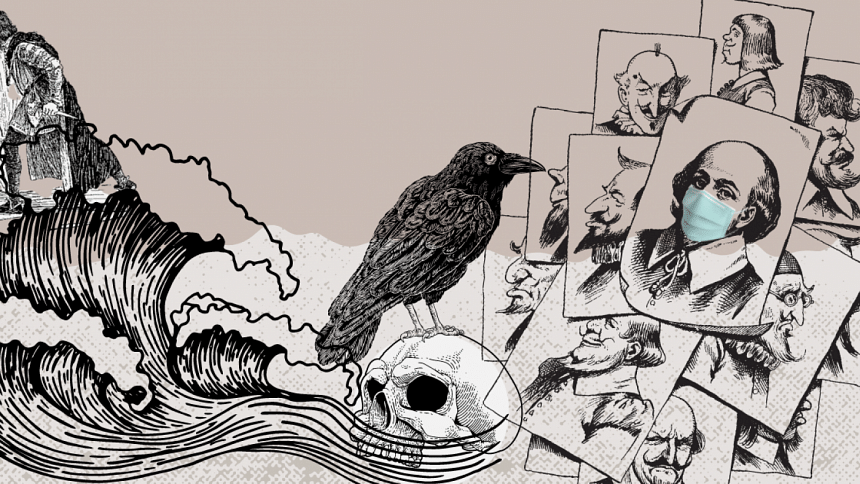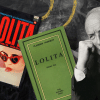Shakespeare—Our Contemporary in the Time of Coronavirus?

When I was eight or nine, my paternal grandfather—a schoolteacher—used to tell me stories about strange ghosts, competing merchants, mistaken identities, wise fools, and even crazy love, among others—stories that I thoroughly enjoyed. He later told me that his stories were based on certain plays written by William Shakespeare (1564-1616), regarded as the greatest writer in the English language and one of the greatest playwrights and poets in the world. I also told my daughter Salma—when she was nine—almost similar stories without concealing their origin in Shakespeare. Listening to a story based on Hamlet—one of the greatest Shakespearean tragedies—Salma thought it was a ghost story that made her "blood cold and her hair to stare," so to speak, and that she would love to share it with her friends. My highschool teacher, Nuruddin Ahmed, told us Hamlet's story, and we thought it was a tense thriller, even a detective story, given that Hamlet—Shakespeare's protagonist—remains hellbent on the question of truth in a creepy world of crime, espionage, and surveillance.
I think there are always those things in Shakespeare that immediately appeal to children. And children are serious little philosophers who relentlessly broach the most profound and fundamental questions about anything and everything around them. The question was already raised by some: Did Shakespeare write mainly for children? So-called "pop" Shakespeare criticism answered that question in the affirmative.
And I think nothing human is alien to Shakespeare. He created more than a hundred major characters and hundreds of minor ones, each with a distinctive voice, as if Shakespeare was a mortal god! Indeed, staggering diversity constitutes Shakespeare's hallmark. This point was repeatedly made by a whole host of critics in the Western world—from Dr. Johnson to Stephen Greenblatt, for instance. In our parts of the world, iconic literary figures such as Ishwar Chandra Vidyasagar, Michael Madhusudan Dutta, Bankim Chandra Chattopadhayay, and Rabindranath Tagore—among many others—marvelled at the sheer diversity of Shakespeare's characters, themes, and styles, although he is much more than diversity as such.
I argue that we continue to live in the era of global Shakespeare. True, Shakespeare has been translated into more than 100 languages. And he has been adapted and appropriated—probably more than any other writer in the world—across the globe, from Peru to the Philippines to Pakistan, or from Brazil to the Bahamas to Bangladesh. Also, Shakespeare was historically pressed into the service of British colonialism and white cultural supremacy; while he was—and he continues to be—reclaimed, reread, remobilised in the interest of anticolonial and even "anticapitalist" resistance and rebellion. There is a character called Caliban in Shakespeare's play The Tempest. He is a slave, a colonized subject, one on whom his master Prospero's language is brutally imposed. Shakespeare gives some of the strongest lines in his play to Caliban: "You taught me language; and my profit on't/ Is, I know how to curse" (Act 1, Scene 2). It's not for nothing that revolutionaries from Karl Marx to Martin Luther King, Jr. loved Shakespeare and used him to make their points, while a whole host of Western thinkers—from Hegel and Nietzsche, to Freud, to Lukács and Lacan, to Benjamin, to name but a few—variously engaged and drew on Shakespeare. And the Caribbean communist poet and activist Aimé Césaire (1913-2008) wrote his play called A Tempest by rewriting Shakespeare's The Tempest in order to make Caliban more than a figure of resistance and turn him into a real dialectician and revolutionary.
But who was Shakespeare? It is generally believed or accepted that Shakespeare—born in the year 1564 at Stratford-upon-Avon, Warwickshire, England—died on his birthday, his 52nd birthday, on April 23, in 1616. But he was baptised on April 26. Since there was generally a lapse of a few days between birth and baptism, Shakespeare's birthday is traditionally celebrated on April 23. He wrote at least 37 plays, 154 sonnets, and quite a number of poems, while he even collaborated on some "lost" plays, although most of his work was not published in his lifetime. Shakespeare is customarily characterised as an Elizabethan playwright, but many of his popular plays were written after Elizabeth's death, given which he is rightly considered a Jacobean writer as well. He also acted in his own and others' plays; while he became a wealthy theatre owner and producer, whose name continues to be associated with the famous Globe Theatre.
As a playwright Shakespeare wrote both tragedies and comedies as well as what have come to be known as "history plays," "problem plays," and "late romances." His early comedies include The Comedy of Errors (1593), The Taming of the Shrew (1593), and The Two Gentlemen of Verona (1592-93); while his first histories include Henry VI (1589-91), Richard III (1592-93), and King John (1594-96). Then there are those "apprentice tragedies"—Titus Andronicus (1593-94), Romeo and Juliet (1595-96), Julius Caesar (1599)—while his famous high comedies include Love's Labour's Lost (1594-95), A Midsummer Night's Dream (1595-96), The Merchant of Venice (1596-97), Much Ado About Nothing (1598-1599), As You Like It (1599), and Twelfth Night (1601-2). Plays such as Richard II (1595), Henry IV (1596-97), The Merry Wives of Windsor (1597), and Henry V (1599) are considered Shakespeare's "major histories;" while his famous problem plays are Troilus and Cressida (1601-2), All's Well That Ends Well (1602-3), and Measure for Measure (1604).
Then, most famously, we have Shakespeare's four great tragedies such as Hamlet (1600-1601), Othello (1604), King Lear (1605), and Macbeth (1606); and his late romances such as Pericles (1607-8), The Winter's Tales (1610-11), and The Tempest (1611), among others. One should also mention his explicitly political and politico-economic plays such as Coriolanus (1607) and Timon of Athens (1607-08). And who can describe the power of money better than Shakespeare? Quoting lines from Shakespeare's Timon of Athens, Marx said: "Shakespeare excellently depicts the real nature of money."
Given the staggering range and richness and rigour of Shakespeare's works, it is simply impossible to convey even a sense of the totality of his work in a short op-ed like this one. But I can only make a few points that underline Shakespeare's contemporaneity once again. Of course, it is by now a truism that Shakespeare dramatises all great and common themes relating to life and death such as love, hate, compassion, sacrifice, compromise, resignation, surrender, victory, defeat, despair, pain, anguish, ambition, hope, dream, goal, work, leisure, even soul, body, food, sex, prayers, play, among countless others, giving us the impression that we—as human beings—are by no means finished products; that we are not yet in a state of being but in a process of becoming.
And one can surely account for Shakespeare's contemporaneity in numerous ways, one of which has to do with his language itself. Indeed, those who use English can be quoting Shakespeare all the time without knowing it. For instance, we continue to use Shakespearean phrases such as "a blinking idiot" (The Merchant of Venice, Act 2, Scene 9), "melted into thin air" (The Tempest, Act 4, Scene 1), "a tower of strength" (Richard III, Act 3, Scene 4), "in my heart of hearts" (Hamlet, Act 3, Scene 2), "what is done is done" (Macbeth, Act 3, Scene 2), even "all of a sudden" (The Taming of the Shrew, Act 1, Scene 1), and "to come full circle" (King Lear, Act 5, Scene 3), to mention but a few, among numerous others.
But does Shakespeare have anything to do with handwashing and "physical/social distancing" at this coronavirus-ridden global conjuncture? Mark these lines uttered by the character Gentlewoman about Lady Macbeth from Macbeth: "It's her accustomed action with her, to seem thus washing her hands. […]" (Act 5, Scene 1). As for physical/social distancing, consider these lines straight from The Merry Wives of Windsor: "In these times/ you stand on distance" (Act 2, Scene 1). More from Shakespeare: "If there be breadth enough/in the world, I will hold a long distance." (All's Well that Ends Well, Act 3, Scene 2). And then Shakespeare famously offers the images and effects of viruses and infections in his plays from, say, Romeo and Juliet to Henry IV to Hamlet to Timon of Athens—ones that seem to be resonating with those who suffer from and are afraid of infection.
In closing, I think that to say that Shakespeare continues to be our contemporary is not enough. I also think it is important to see how his work enables us to interrogate and even change the world we live in. I'm with the Shakespeare critic Simon Critchley when he says, "The banal, biscuit-box Shakespeare needs to be broken up and his work made dangerous again." In other words, we can always return to Shakespeare to see what is wrong with our time that is "out of joint" and what we can possibly do "to set it right."
Dr Azfar Hussain is interim director of the graduate programme in social innovation, and associate professor of integrative, religious, and intercultural studies at Grand Valley State University in Michigan, US. He is also the vice-president of the US-based Global Center for Advanced Studies (GCAS).

 For all latest news, follow The Daily Star's Google News channel.
For all latest news, follow The Daily Star's Google News channel. 








Comments